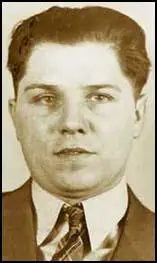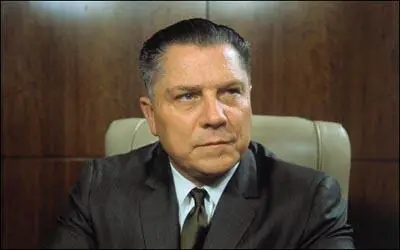Jimmy Hoffa

James Riddle Hoffa, the son of a coal driller, was born on 14th February, 1913. His father died when he was seven and in 1924, the family moved to Detroit.
Jimmy Hoffa left school at fourteen and worked as a department-store stock boy. An active trade unionist, in 1932, he led a strike at a Detroit grocery store. By the age of 37 he was chairman of the Central States Drivers Council in 1940 and two years was elected president of the Michigan Conference of Teamsters.
In 1952 Jimmy Hoffa became vice president of the Teamsters Union under Dave Beck, the president. Allegations were made in 1956 that the leadership of the union was involved in illegal activities. The Select Committee on Labor, that included Joe McCarthy, Barry Goldwater, Karl Mundt and John F. Kennedy, decided that these charges needed to be investigated.
Robert Kennedy, chief counsel of the committee, was instructed to collect information and discovered several financial irregularities. This included taking $85,119 between 1949 and 1953 from union funds to pay his own personal bill. The investigation also revealled that a Seattle builder had received $196,516 out of union funds to pay for work done on Beck's home. The investigations were televised and Kennedy's questioning turned him into a national political figure.
Beck was eventually imprisoned for five years and Jimmy Hoffa became the new president of the Teamsters Union. Robert Kennedy now began investigating Hoffa and he was eventually charged with corruption. Kennedy claimed that Hoffa had misappropriated $9.5 million in union funds and had corruptly done deals with employers. Hoffa's lawyer, Edward Bennett Williams, managed to persuade the jury to find him not guilty. George Meany, president of the AFL-CIO, did not agree with the verdict and Hoffa and the Teamsters Union were expelled from the association.
Jimmy Hoffa was popular with his members and in 1960 was re-elected as president of the Teamsters Union. A long-term supporter of the Republican Party, Hoffa was a generous supplier of funds to Richard Nixon in his presidential struggle with John F. Kennedy. During the campaign, Robert Kennedy sent Hoffa a copy of his book, The Enemy Within. Kennedy wrote inside: "To Jimmy. I'm sending you this book so you won't have to use union funds to buy one. Bobby."
After Kennedy's election victory in 1960 he appointed Robert Kennedy as his attorney general. Once in office, Kennedy resumed his investigations into Hoffa's activities. Hoffa was eventually charged with taking money from the union's $300 Pension Fund. J. Edgar Hoover, a long-term opponent of the Kennedys, passed FBI files on the attorney general to Roy Cohn, who in turn gave them to Hoffa. However, Hoffa, who disapproved of the Kennedy's adulterous behaviour, declined to use this material against his prosecutors.
If you find this article useful, please feel free to share on websites like Reddit. You can follow John Simkin on Twitter, Google+ & Facebook, make a donation to Spartacus Education and subscribe to our monthly newsletter.
A former official of the union, E. G. Partin, was in prison facing charges of kidnapping, murder, robbery and rape, agreed to do a deal with the authorities and provide evidence against Hoffa. At the first trial at Nashville in October, 1962, the hung jury voted 7-5 for acquittal. The judge, believing that Hoffa's team were guilty of jury tampering, called a mistrial. At the second trial at Chattanooga in January, 1964, Hoffa was found guilty and sentenced to eight years in prison.
In December, 1971, President Richard Nixon ordered Hoffa's release. Later, FBI records revealed that Nixon had received illegal campaign donations from the Teamsters Union in exchange for a presidential pardon. After his release Hoffa travelled the country campaigning for prison reform. He also attempted to return as leader of the Teamsters Union. On 30th July, 1975, James Hoffa disappeared when travelling to a meeting with the Detroit gangster, Anthony Giacalone. In 1982 Hoffa was legally declared "presumed dead".
In 1989 Kenneth Walton, the head of the FBI's Detroit office, told The Detroit News he knew what happened to Hoffa. “I’m comfortable I know who did it, but it’s never going to be prosecuted because… we would have to divulge informants, confidential sources.”

On 14th January, 1992, the New York Post claimed that Hoffa, Santos Trafficante and Carlos Marcello had all been involved in the assassination of President John F. Kennedy. Frank Ragano was quoted as saying that at the beginning of 1963 Hoffa had told him to take a message to Trafficante and Marcello concerning a plan to kill Kennedy. When the meeting took place at the Royal Orleans Hotel, Ragano told the men: "You won't believe what Hoffa wants me to tell you. Jimmy wants you to kill the president." He reported that both men gave the impression that they intended to carry out this order.
In his autobiography, Mob Lawyer (1994) (co-written with journalist Selwyn Raab) Frank Ragano added that in July, 1963, he was once again sent to New Orleans by Hoffa to meet Santos Trafficante and Carlos Marcello concerning plans to kill President John F. Kennedy. When Kennedy was killed Hoffa apparently said to Ragano: "I told you could do it. I'll never forget what Carlos and Santos did for me." He added: "This means Bobby is out as Attorney General". Marcello later told Ragano: "When you see Jimmy (Hoffa), you tell him he owes me and he owes me big."
It is possible that Jimmy Hoffa was killed in 1975 to stop him from testifying in front of the House Select Committee on Assassinations. Fellow Mafia suspect in the Kennedy assassination, Sam Giancana, was also murdered at the same time Hoffa disappeared.
In 1989 Kenneth Walton, the head of the FBI's Detroit office, told The Detroit News he knew what happened to Hoffa. “I’m comfortable I know who did it, but it’s never going to be prosecuted because… we would have to divulge informants, confidential sources.”
Just before he died, Frank Sheeran, confessed to author Charles Brandt that he killed Jimmy Hoffa. According to Sheeran, Chuckie O'Brien drove Hoffa, Sheeran and another mobster Sal Briguglio to a house in Detroit. Hoffa and Sheeran went into the house and the other two men drove off. Sheeran says he shot Hoffa twice behind the right ear. After the murder, Sheeran says he left the house and was told Hoffa was cremated. The full story appears in Brandt's book I Heard You Paint Houses (2003).
Primary Sources
(1) Joe Konowe, a close associate of Jimmy Hoffa, interviewed by C. David Heyman for his book, A Candid Biography of Robert F. Kennedy (1998)
Jimmy delighted in showing people, particularly people with substantial education, that he was their equal or better. And he was able to do this because, notwithstanding his ninth-grade education, he was a quick study. With the seriousness of the depression, the loss of his father, the enormous workload that his mother undertook - doing washing and houseleaning - and with the children helping out, Jimmy always had a soft spot for the so-called underclass and a great disdain for people who were not well educated but who came from wealthy families. And that was the cause of the fight, the ongoing vendetta between Kennedy and Hoffa.
(2) Robert Kennedy, Look Magazine (2nd September, 1958)
At birth, it is a Teamster who drives the ambulance to the hospital. At death, a Teamster who drives the hearse to the grave. Between birth and death, it is the Teamsters who drive the trucks that bring you your meat, milk, clothing and drugs, pick up your garbage and perform many other essential services.
The individual truck driver is honest, and so are the vast majority of local Teamster officials - but they are completely under the control and domination of certain corrupt officials at the top. Picture this power, then, and the chaos that could result in these officials were to gain control over sea and other transportation outlets. Such a force could conceivably cause anyone - management and labor alike - to capitulate to its every whim. With Hoffa at the controls of the union that will dominate the transport alliance, this power would certainly be in the wrong hands.
(3) Roy Cohn, interviewed by C. David Heyman for his book, A Candid Biography of Robert F. Kennedy (1998)
Hoffa and I would occasionally dine together in New York. I asked Hoover if I could give Hoffa the RFK files. "Go ahead," he said. When I presented them, Hoffa asked, "What do I do with them?" "I don't know," I responded, "Save them for a rainy day."

